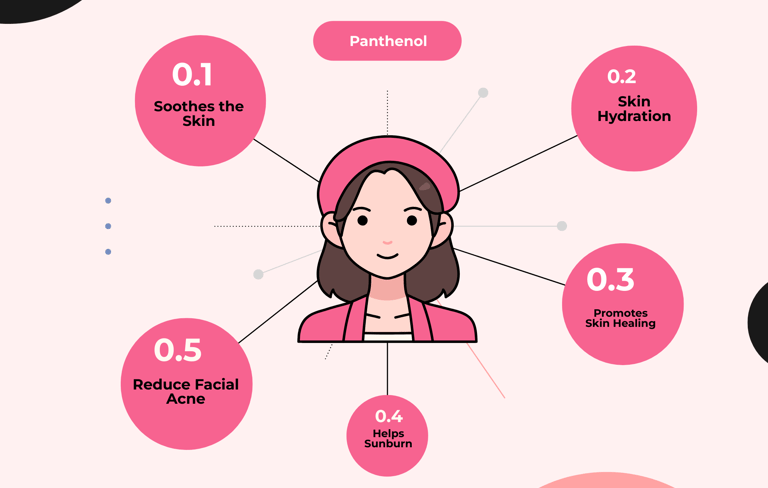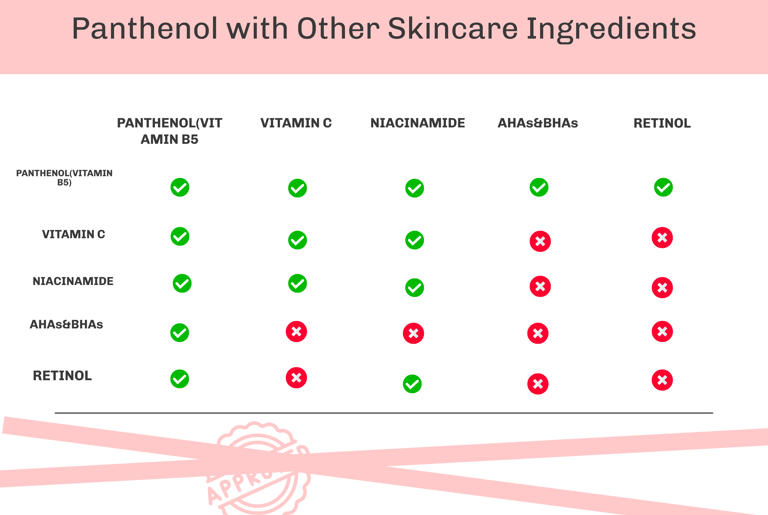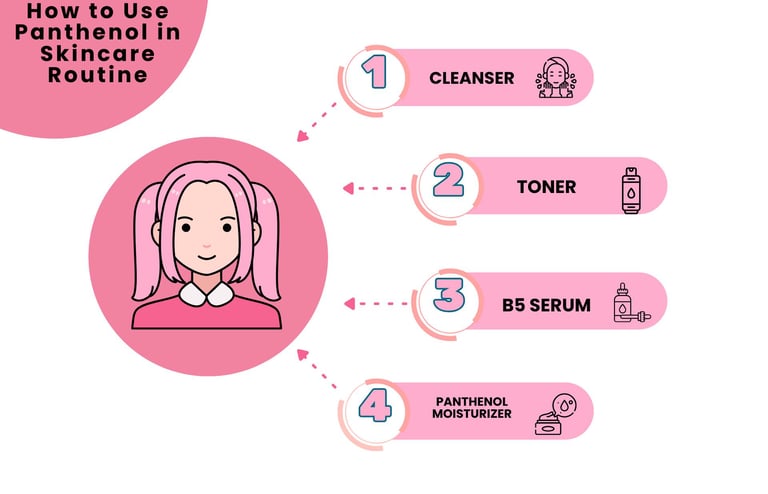Vitamin B5 for Skin + How to Add It in Your Skincare Regimen
SKINCARE INGREDIENTS


Overview
May be you have seen this ingredient in your skincare or even haircare product ingredients’ list and asked yourself what is this ingredient and what does it do for your skin?
Vitamin B5 or pantothenic acid also labeled as panthenol is a type of B vitamin, a water soluble vitamin that is very essential nutrient in the body. Many individuals underestimate the capabilities of panthenol since it does not get enough spotlight compared to other vitamins and antioxidants in skincare. It is very important and some of the things that vitamin B5 can do include:
Synthesis of CoEnzyme A (CoA): CoEnzyme A is in charge of metabolizing fatty acids, important in many pathways and the Krebs cycle.
Breakdown of carbohydrates, proteins and fats to be utilized by the body.
Cellular energy of production
Vitamin B5 is rarely deficient in the body, since it can be found in many foods. It can also be supplemented in forms of powder, pills or tablets.
Table of Contents
1.0 Overview
2.0 Vitamin B5(Panthenol) in Skincare
2.1 Fun Facts
3.0 What Does Vitamin B5(Panthenol) Do for Your Skin?
4.0 What are the Side Effects of Panthenol?
5.0 Vitamin B5 Foods
7.0 Derivatives/Forms of Vitamin B5
8.0 Vitamin B5(Panthenol) and Other Skincare Ingredients
9.0 How to Include Panthenol in Your Skincare Routine
10.0 Frequently Asked Questions
11.0 References
Vitamin B5 (Panthenol) in Skincare
Vitamin B5 also known as panthenol is very popular now in skincare always used alongside ingredients such as
hyaluronic acid,
glycerin and
niacinamide(vitamin B3)
Vitamin B5 (Panthenol) can be very important in improving your skin health when taken internally through diet or supplements. Vitamin B5 is very good ingredient since it can deeply penetrate into the skin and hydrate it.
FUN FACTS
Vitamin B5(pantothenic acid) was first discovered by Roger J. Williams in 1933. He named it from a Greek word ‘pantothen’ meaning ‘from everywhere’ since he found it in every food he tested.
A popular hair care brand Pantene derives its name from panthenol, a form of vitamin B5.
Some bacteria species like E.Coli or Salmonella Typhimurium can produce vitamin B5.
Tanzanite Skincare
What Does Vitamin B5(Panthenol) Do for Skin?
Though vitamin B5 or panthenol is overlooked ingredient it has proven its worthy in skincare community. Its high level of tolerability and bioavailability in the skin. Here are vitamin B5 for skin benefits:
1. Skin Hydration and Moisturization
There is no doubt that vitamin B5 can provide hydration to skin. Vitamin B5 is a humectant as well as a powerful anti-oxidant compared to other prominent hydrators in the skincare industry like glycerin that are limited to their roles as hydrating ingredients.
Due to its smaller molecular size compared to glycerin and hyaluronic acid, it can deeply penetrate the skin layers and moisturize it. It also can prevent transdermal water loss (TEWL).
Here Dr. Shereene Idriss explains, ‘’…has an ability to go deep it also has an ability to help proliferate fibroblasts…is important because fibroblasts help secrete collagen and having that proliferation, that healthy stimulation of fibroblasts help to maintain a firm and well-structured skin barrier…”
A research study found out using panthenol-based (form of vitamin B5) formulations of concentration of 1% applied on skin for 30 days to be more effective in decreasing TEWL.
2. Enhances Skin Barrier
Vitamin B5 and its alcohol derivative, panthenol both have been found to be beneficial to skin’s integrity. Vitamin B5 or panthenol containing skincare products can help to increase skin cell renewal and skin cell turnover alongside moisturization. This can strengthen the skin as well as promote skin radiance and youthful appearance.
One study conducted in vitro discovered that pantothenic acid promoted synthesis of keratinocyte growth factor and collagen in fibroblasts in skin tissues in a cultured medium.
3. Calms and Soothes the Skin
As already explained, vitamin B5 or panthenol is a very gentle skincare ingredient that can soothe the skin due to its anti-inflammatory properties. If you have skin issues such as dryness, itchiness or redness then panthenol got you covered.
If you’re using other powerful ingredients such as vitamin C or retinol then adding panthenol/vitamin B5 or looking for skincare products containing vitamin B5 alongside retinol or vitamin C can reduce side effects from them.
A clinical study done on subjects discovered that cream containing panthenol could alleviate skin sensitivity while promoting skin microbiota for skin’s health.
4. Reduces Facial Acne
Acne is a very common skin issues. Most of the time harsher ingredients may be recommended to deal with it using be it TCA peels to sulfur-containing ointment. Now there is a solution that is gentle and safe too for your skin to use topically. Panthenol, an alcohol derivative of Vitamin B5 can play a role in controlling and reducing facial acne.
A clinical study found that vitamin B5 can reduce sebum production and acne, its deficiency may promote the latter. It makes sense since we already know by now that vitamin B5 is used in many metabolic pathways but also supports skin microbiota, lacking it may throw these things out of balance.
Another study, where test subjects were given pantothenic acid orally showed signs of improvement of their facial acne than the placebo group in a span of 12-week period.
5. Promotes Skin Healing
Vitamin B5 is an anti-inflammatory and also anti-microbial ingredient that can be beneficial in skin health. It can therefore promote wound healing on skin, blemishes and micro tears on the skin. It can support skin cell regeneration which is what you need for healthy skin.
One study observed how vitamin B5 supported wound healing and improved immune function which is essential for recovery.
Another study was done on rabbits and observed that supplemental pantothenic acid (Vitamin B5) sped up normal wound healing process post-surgery.
6. Reduces Sunburn
When topical vitamin B5 is included in sunscreen gels or creams, this can help to prevent sunburn on the skin especially for those with fairly light skin that does not tan easily should opt for sunscreen with this ingredient to avoid their skin getting red and sore.
7. Reduce Symptoms of Eczema
There is substantial evidence that a derivative of vitamin B5, dexpanthenol containing skincare products can alleviate symptoms caused by atopic dermatitis also known as eczema.
Atopic dermatitis can cause irritation, itchiness, flares, dryness and overall skin discomfort. Using dexpanthenol can significantly reduce these adverse symptoms.
A study suggested that this dexpanthenol preparation was safe, effective and well-tolerated with skin having these issues.
8. Prevent Signs of Aging
Until this point we’ve seen how vitamin B5 or panthenol can help the skin for a specific issue but if you take a closer look vitamin B5 is a potent yet gentle anti-aging ingredient that can smoothen out those fine lines, making your skin soft, plump and supple on the way.
Vitamin B5/Panthenol when used with other ingredients can slow down or prevent aging of the skin.


What are the Side Effects of Panthenol?
Panthenol(Vitamin B5) on its own can not cause any adverse effects when applied on skin though other ingredients in the formulation can cause irritation or redness.
Doctor Anne had this to say, “Dexpanthenol[a vitamin B5 derivative] is not a known allergen, but as it is possible to be allergic to anything. It is always better to patch test, especially when using it on irritated skin with an already compromised skin barrier.”
Is Panthenol Pore Clogging?
As an ingredient on its own, it is less likely to clog pore since it is non-comedogenic in nature. Other ingredient such as occlusives in the skincare product formulation may cause the pores to clog and not panthenol on its own. So rest assured you’re safe while using it.
Doctor Anne further stated, “…panthenol seems to be well tolerated, not clog pores or lead to breakouts.”
Vitamin B5 Foods
You have to know in the first place that vitamin B5(pantothenic acid) is found in many foods in diet, especially plant-based foods and is usually consumed everyday without even noticing it. Now let’s see some of the examples for plant-based categories:
Fruits: avocados,
Nuts and seeds: sunflower seeds,
Legumes: lentils, peas and some bean types
Whole grains: brown rice, oats, whole brown bread
Leafy Greens: broccoli, sweet potatoes, chicory greens, mushrooms and cauliflower
For animal-based vitamin B5 here are some few examples
Dairy products: milk, cheese, butter, yoghurt
Eggs
Meats: chicken, salmon, beef, lobster, pork
Organ meats: kidneys, beef liver and heart
Most of the times even processed foods in the shelf are fortified with vitamin B5, so its always abundant in our various food sources despite our diet preferences.
Opt for vitamin B5 food sources that can be eaten raw, without being cooked. After being cooked vitamin B5 is depleted by heat. Instead just make raw salads, eat nuts and seeds to reap more vitamin B5 for your skin health.
If you need to cook the food then prefer cooking methods that produce less reactive oxygen stress(ROS) when heated like steaming or boiling.
Vitamin B5 Supplements
Frankly speaking, it is very rare to experience vitamin B5 deficiency unless you have a genetic disorder that inhibit its absorption. There are scientific evidence that support oral intake of vitamin B5(pantothenic acid) to decrease acne lesions.
Vitamin B5 supplements can be taken everyday and excess vitamin B5 in the body can be excreted as urine out of the body.
Is panthenol (Vitamin B5) FDA approved?
Like any other supplemental drug, it is not approved by FDA but considered safe for use, either orally or topically. It is also considered as a clean ingredient in skincare setting.
Can I Use pantothenic acid (Vitamin B5) everyday?
Of course! It is vey gentle ingredient that is well tolerated by skin and when take internally. So, don’t worry about vitamin B5 accumulating in excess in the body since like any other vitamin B it will be removed by peeing out the excess.
How much vitamin B5 is recommended per day?
It is recommended to take vitamin B5 at 5mg per day for adults and excess to up to 10 grams may lead to stomach upset, diarrhea or mild headaches.
Is vitamin B5 supplement safe for pregnant and breastfeeding women?
Vitamin B5 supplements are considered safe for pregnant and breastfeeding women. Pregnant women should not take more than 6mg while breastfeeding women can take up to 7mg of vitamin B5. Check with your doctor to see if it will be appropriate to take this supplement at this stage or if you’re taking other medications or have underlying medical conditions in the first place.
What to not take with vitamin B5(pantothenic acid) supplements?
If you’re on certain medications then it may not be right for you. Do not use vitamin B5 supplements with
Azithromycin,
Clarithromycin,
Erythromycin and
Roxithromycin
Avoid using vitamin B5 together with herbal medicines. You may want to skip alcohol altogether when using vitamin B5 supplements. Consult with your doctor before using it.
Derivatives/Forms of Vitamin B5
1. Pantothenic Acid
This is the basic form of vitamin B5. It is found in almost any type of food and has high bioavailability than other forms. Other forms of vitamin B5 will eventually be converted to pantothenic acid for it to be absorbed in the gut or skin.
2. Panthenol/Dexpanthenol
This is an alcohol derivative of pantothenic acid. It is also known as pro vitamin B5 or other trademark name Bepanthen®. It the most common form used in both skincare and haircare products. It is suitable for all skin types.
This is form is made in the lab and can be converted to pantothenic acid.
3. Sodium Pantothenate
It is a salt of pantothenic acid and used in skincare and haircare products for its moisturizing properties though it is considered less stable than calcium pantothenate.
4. Calcium Pantothenate
It is the salt of pantothenic acid. It is very stable form found in dietary supplements, skin boosters and other skincare products.
5. Pantethine
A stable form of pantothenic acid with two disulfide bonds. It is derived from vitamin B5 and act as intermediary in production of coenzyme A. It is usually sold as dietary supplement to lower blood cholesterol.
Other forms of Vitamin B5
These are mostly found in foods and have not make their mark in the skincare industry so far. These include
Coenzyme A (CoA): It is synthesized from vitamin B5, which can then be used in various metabolic pathways and energy production in the body.
Acyl carrier protein (ACP): It is crucial in pathways involving vitamin B5 in one way or the other.
4’-phosphopantethine: It is found in foods and usually directly converted to pantothenic acid during food absorption.
Vitamin B5(Panthenol) and Other Skincare Ingredients
In skincare setting, panthenol can be used with many ingredients without experiencing any adverse side effects including skin redness, dryness, irritation or itchiness. Instead panthenol can counteract side effects from stronger active ingredients such as vitamin C and retinol.
Hyaluronic Acid
Is panthenol better than hyaluronic acid?
If you want skin hydration at deeper skin levels then go for panthenol/vitamin B5 and skip hyaluronic acid which can be pro inflammatory when used in smaller molecular size. Though there are many skincare products now that include both vitamin B5 and hyaluronic acid in their formulations.
Can I mix panthenol with hyaluronic acid?
These two ingredients can work well together, providing the skin with hydration and moisturization. If you get side effects are more likely to be caused other ingredients in the formulation of the product.
Niacinamide
Many people seem to be confused when it comes to niacinamide(vitamin B3) and panthenol(vitamin B5) but they’re different skincare active ingredient with many anti-aging properties. Both are pretty tolerable and effective by all skin types
Can I use panthenol with niacinamide?
You can use panthenol and niacinamide together in your skincare routine without worrying about any negative consequences. If skeptical do a patch test before mixing the two or layer them in your skincare routine.
Vitamin C
Both vitamin C and panthenol(Vitamin B5) are water-soluble ingredients that are compatible in formulations. Vitamin C in higher concentrations of 15% to 20%, panthenol can soothe the skin from sensitivity caused by vitamin C.
Can I mix panthenol and vitamin C together?
Definitely, you can! Vitamin C can brighten and reduce appearance of dark spots while panthenol can reduce skin dryness by keeping it hydrated and moisturized. Applying serum or moisturizer with these ingredients will go a long way in improving your skin health.
Can panthenol lighten your skin?
By itself panthenol can not lighten your skin complexion, it can only hydrate your skin. You can pair it with niacinamide, retinol, alpha arbutin or vitamin C to get that radiant, glowing and lighter complexion you desire.
Retinol
This skincare active can be very harsh when used alone. People with skin conditions such as psoriasis, eczema or rosacea and sensitive skin type may experience adverse effects. Find a serum or moisturizer with low concentration of retinol from 0.0005% to 0.5% with panthenol in it.
Can I mix panthenol with retinol?
Yes, though retinol is very strong and can cause skin redness and irritation, using panthenol, mixed in the formulation or in another skincare product, let’s say a moisturizer which can counteract retinol’s side effects and soothe the skin.
How to Apply Panthenol?
Panthenol is usually included in skincare products in all steps of skincare routine. It will be more beneficial in leave on products such serums, creams or moisturizers in which panthenol can get time to seep through the skin layers compared to wash off products.
Sunscreens
Panthenol by itself can not protect your skin from the sun but can calm and soothe sunburned skin. Look for sunscreen or sunblock of 30 to 50++SPF(Sun Protection Factor) broad spectrum containing panthenol which can reduce redness and soothe sunburns.
What ingredients should I not mix with panthenol?
To be fair, panthenol is not harsh to sensitive skin or other skin types even people with skin conditions can benefits from it, though you have to be cautious when using it with products containing
AHAs(e,g glycolic acid, lactic acid) and
BHAs(salicylic acid).


How to Include Panthenol In Your Skincare Routine
As in any skincare routine, you’ll follow the basic steps of cleansing, serum and moisturizing or /and sun protection. Always find a formulation that is a leave on in order to get optimal results when using products containing panthenol(vitamin B5).
1. Cleansing
Start off, your skincare routine morning (AM) or evening (PM) by removing makeup, grime or grit from former skincare routine. Use micellar water or oil-based face cleanser followed by water-based face cleanser for a squeaky clean skin.
2. Toning
Next step, prep your skin for serum with a toner. Use a pad to apply your toner on the skin then let it sit and dry out for 2 to 3 minutes. Find ingredients such as galactomyces, PHAs or Centella Asiatica because they are more gentle than the likes of glycolic acid or lactic acid.
3. Serum
Apply your serum which has niacinamide + panthenol or vitamin C + panthenol or hyaluronic acid + panthenol, they make for a great combination. You can then apply oil-based serum such as retinol, bakuchiol or vitamin E serum, in that order. If your serum has no panthenol then consider using it in a moisturizer.
4. Moisturizing
Then apply panthenol cream or moisturizer to seal the serum in the skin. This is also good for acne prone skin, panthenol reduces acne so worry out about your pore being clogged and leading to acne.
Should I use panthenol serum, panthenol cream or panthenol moisturizer?
For more better results, it seems that panthenol creams or moisturizers are more better than panthenol serums. After applying your serum with another active ingredient seal it with a panthenol moisturizer.
Dr. Dray went on to insist as follows,”…a moisturizer that has panthenol in it is just fine oh!, seriously consider these products if you are somebody who has oily skin and are moisturizer-phobic because are great for you…”
5. Sun Protection
If you are prone to redness and sunburn or your skin complexion fall on Fitzpatrick scale of I and II consider getting a sunscreen or sunblock which contain panthenol to soothe your skin from sunburn.
Which products will you recommend that contain panthenol?
In the skincare market there is no shortage of products with panthenol, most of the time it is included in the product but not mentioned as an active ingredient, just pause and take a look on all your skincare and hair products, I bet you won’t miss it! Here are some recommendations you’ll love
Cetaphil Redness Relief Night Moisturizer
Forte Moisturizer


Frequently asked questions
Is pantothenic acid or panthenol?
Both are vitamin B5s though panthenol is an alcohol derivative of vitamin B5. Don't worry about it being an alcohol, it is not a bad alcohol, it moisturizes your skin when you apply it.
What concentration of panthenol is right to use?
Panthenol is usually found in skincare and hair products in concentration of 0.5 to 10%. Though skincare products with concentrations from 5% to 10% are found to be more effective.
Can I use panthenol as a daily moisturizer?
Panthenol can be good moisturizer for dry skin to quench dehydrated skin daily. It is even better than hyaluronic acid due to its anti-inflammatory properties that can be used to soothe skin with conditions such as psoriasis, atopic dermatitis and rosacea.
Can I use panthenol everyday?
Yes, of course! Panthenol is hypoallergenic and can be well-tolerated with all skin types and can be used everyday in both morning or/and evening routine.
Can I use Panthenol Cream on itchy skin?
Panthenol cream can provide relief to itchy skin since it has anti-inflammatory properties that can calm and reduce redness on the skin.
References
Flavio B Camargo Jr, et al. (2011). Skin moisturizing effects of panthenol-based formulations. https://pubmed.ncbi.nlm.nih.gov/21982351/
Michael Yang, et al. (2014). A Randomized, Double-Blind, Placebo-Controlled Study of a Novel Pantothenic Acid-Based Dietary Supplement in Subjects with Mild to Moderate Facial Acne. https://pmc.ncbi.nlm.nih.gov/articles/PMC4065280/
Jilian L Capodice, et al. (2012). Feasibility, Tolerability, Safety and Efficacy of a Pantothenic Acid Based Dietary Supplement in Subjects with Mild to Moderate Facial Acne Blemishes https://www.scirp.org/journal/paperinformation?paperid=22372
Yoon Sun Cho, et al. (2022). Use of Dexpanthenol for Atopic Dermatitis—Benefits and Recommendations Based on Current Evidence. https://www.mdpi.com/2077-0383/11/14/3943#
Xianghua Zhang, et al. (2024). Efficacy and safety of a cream containing panthenol, prebiotics, and probiotic lysate for improving sensitive skin symptoms. https://pmc.ncbi.nlm.nih.gov/articles/PMC10772476/
Alaa A Gheita, et al. (2019). The potential role of B5: A stitch in time and switch in cytokine. https://pubmed.ncbi.nlm.nih.gov/31691401/
Aprahamian M, et al. (1985). Effects of supplemental pantothenic acid on wound healing: experimental study in rabbit. https://www.sciencedirect.com/science/article/abs/pii/S0002916523348032
Daisaku Kabayashi, et al. (2011). The Effect of Pantothenic Acid Deficiency on Keratinocyte Proliferation and the Synthesis of Keratinocyte Growth Factor and Collagen in Fibroblasts. https://www.sciencedirect.com/science/article/pii/S1347861319307893
